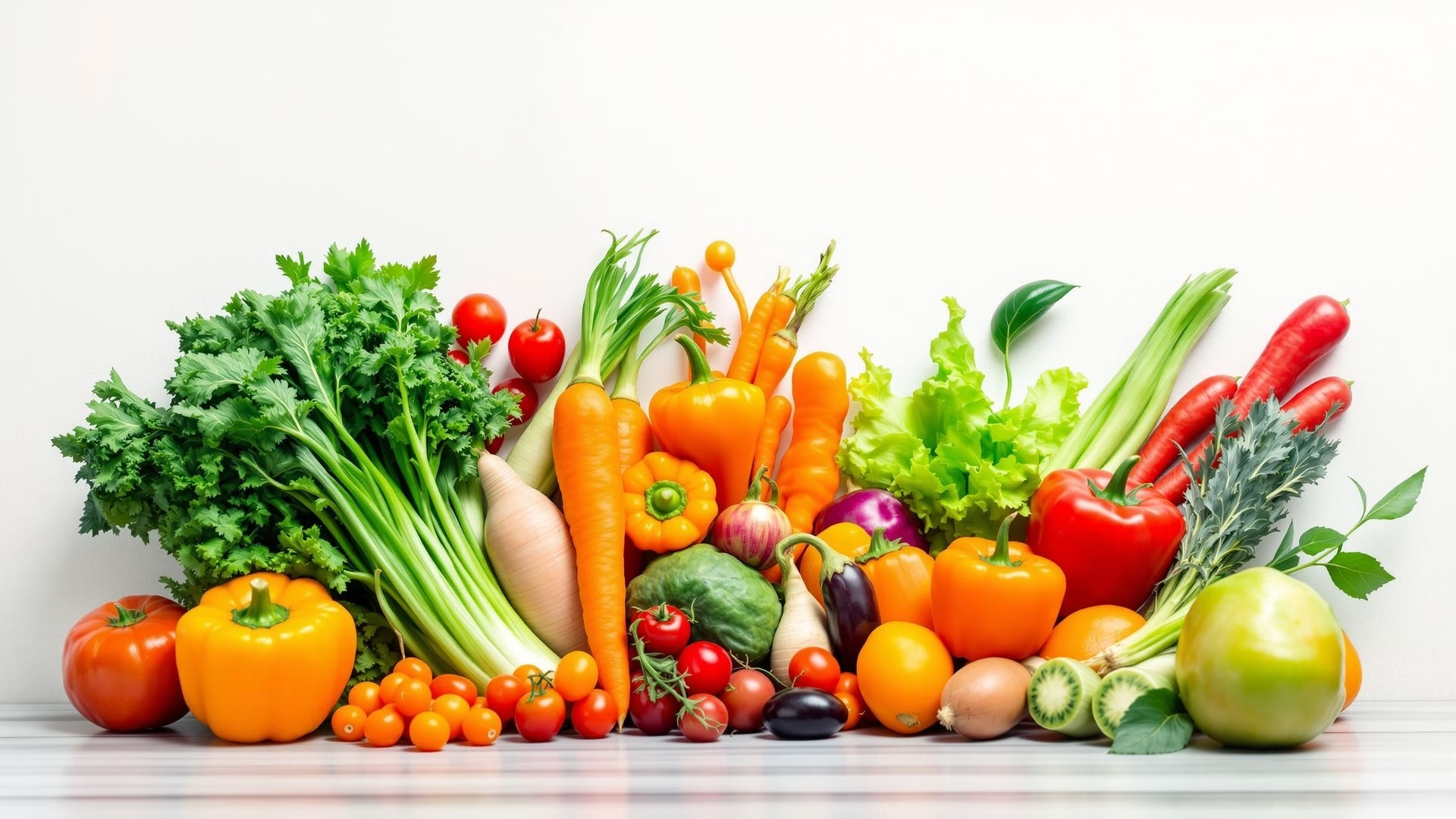Top 10 Best Gut Health Foods: Boost Your Digestion Naturally!
In today's fast-paced world, gut health often takes a backseat to our busy lives.
However, nurturing our digestive system is more crucial than ever for overall wellness.
The foods we consume play a pivotal role in maintaining a healthy gut, influencing not just digestion but also our mood, energy levels, and immunity.
Enter the world of gut health foods—nature's secret arsenal for boosting digestion naturally!
In this article, we’ll explore the top 10 best gut health foods, each loaded with essential nutrients and probiotics that can transform your digestive experience.
From vibrant vegetables to powerful probiotics, these foods can help you feel lighter, more energetic, and ready to conquer your day.
Dive in to discover how simple dietary changes can pave the way for a happier, healthier gut!
Understanding Gut Health and Its Importance

Gut health is a crucial aspect of overall wellness that often goes unnoticed.
The gut, or gastrointestinal tract, is home to trillions of microorganisms, including bacteria, viruses, and fungi, collectively known as the gut microbiome.
These microorganisms play a significant role in various bodily functions, such as digestion, nutrient absorption, immune response, and even mood regulation.
Maintaining a balanced gut microbiome is essential for ensuring that these processes run smoothly, ultimately contributing to better health and well-being.
When gut health is compromised, it can lead to a range of issues, from digestive discomfort like bloating and constipation to more serious conditions like irritable bowel syndrome (IBS) and inflammatory bowel disease (IBD).
Moreover, an unhealthy gut can impact mental health, leading to symptoms of anxiety and depression.
This is because the gut and brain are closely connected through the gut-brain axis, a bidirectional communication system that links the central nervous system with the enteric nervous system in the gut.
Given the pivotal role that gut health plays in overall wellness, it is essential to prioritize it through our dietary choices.
incorporating gut-friendly foods into our diets, we can nurture our gut microbiome, support digestive health, and enhance our overall quality of life.
In the following sections, we will dive into the top 10 best gut health foods and explore their benefits in detail.
The Role of Diet in Gut Health
Diet is one of the most influential factors in shaping the gut microbiome.
The foods we consume provide the necessary nutrients and compounds that feed the beneficial bacteria in our gut, helping them thrive and maintain a balanced microbial environment.
Conversely, a poor diet high in processed foods, sugars, and unhealthy fats can disrupt the gut microbiome, leading to an overgrowth of harmful bacteria and inflammation.
A diverse and nutrient-rich diet can promote a healthy gut microbiome by providing a variety of fibers, prebiotics, and probiotics.
Fibers, found in fruits, vegetables, whole grains, and legumes, serve as food for gut bacteria, allowing them to produce short-chain fatty acids (SCFAs) that support gut health.

Prebiotics, a type of fiber, specifically nourish beneficial bacteria, while probiotics are live microorganisms that can replenish and enhance the gut microbiome.
In addition to fibers, prebiotics, and probiotics, other nutrients such as polyphenols, found in fruits and vegetables, and omega-3 fatty acids, found in fatty fish and flaxseeds, also contribute to gut health.
By making mindful dietary choices and prioritizing gut-friendly foods, we can support a balanced gut microbiome and promote overall health and well-being.
Top 10 Foods for Gut Health
1. Yogurt
Yogurt is one of the most well-known probiotic-rich foods. It is made by fermenting milk with live bacteria, typically Lactobacillus and Bifidobacterium strains.
These probiotics can help replenish and maintain the balance of beneficial bacteria in the gut, improving digestion and boosting the immune system.
Regular consumption of yogurt has been linked to reduced symptoms of IBS and other digestive disorders.
When choosing yogurt, it is important to opt for varieties that contain live and active cultures, as these are the beneficial bacteria that provide gut health benefits.
Additionally, plain, unsweetened yogurt is preferable to avoid added sugars that can negatively impact gut health.
Greek yogurt is an excellent option as it is higher in protein and often contains more probiotics compared to regular yogurt.
2. Kefir
Kefir is a fermented dairy product similar to yogurt but with a thinner consistency. It is made by adding kefir grains, which are a combination of bacteria and yeast, to milk.
This fermentation process results in a tangy, probiotic-rich beverage that contains a diverse range of beneficial bacteria and yeasts.
Kefir has been shown to improve lactose digestion, reduce inflammation, and support a healthy gut microbiome.
Just like yogurt, it is essential to choose kefir that contains live and active cultures.
Kefir can be enjoyed on its own, added to smoothies, or used as a base for salad dressings and other recipes.
For those who are lactose intolerant or prefer a non-dairy option, water kefir made from sugar water or coconut water is a great alternative that still provides probiotic benefits.
3. Sauerkraut
Sauerkraut is a traditional fermented cabbage dish that is rich in probiotics and fiber. The fermentation process involves lactic acid bacteria, which not only preserve the cabbage but also produce beneficial bacteria that support gut health. Sauerkraut is an excellent source of vitamin C, vitamin K, and various B vitamins, all of which contribute to overall health.
To reap the gut health benefits of sauerkraut, it is important to choose unpasteurized, raw varieties, as pasteurization can kill the beneficial bacteria. Homemade sauerkraut is also a great option and relatively easy to prepare. Incorporating sauerkraut into meals can be as simple as adding it to sandwiches, salads, or as a flavorful side dish.
4. Kimchi
Kimchi is a traditional Korean dish made from fermented vegetables, typically cabbage and radishes, seasoned with spices, garlic, ginger, and fish sauce. Like sauerkraut, kimchi undergoes a fermentation process that produces beneficial lactic acid bacteria. Kimchi is known for its probiotic content, which can enhance gut health, improve digestion, and boost the immune system.
In addition to probiotics, kimchi is rich in vitamins A, B, and C, as well as antioxidants that help fight inflammation. The spices and ingredients used in kimchi, such as garlic and ginger, also have antimicrobial and anti-inflammatory properties that further support gut health. Kimchi can be enjoyed as a side dish, added to soups, or used as a flavorful topping for various dishes.
5. Miso
Miso is a traditional Japanese seasoning made from fermented soybeans, rice, or barley. The fermentation process involves the use of a mold called Aspergillus oryzae, which breaks down the ingredients and produces beneficial bacteria and enzymes. Miso is rich in probiotics, which can help balance the gut microbiome and improve digestion.
Miso is also a good source of essential nutrients such as protein, vitamins B and K, and minerals like manganese, zinc, and copper. Miso soup is a popular way to incorporate miso into the diet, but it can also be used as a seasoning in marinades, dressings, and sauces. It is important to add miso to dishes at the end of cooking to preserve the beneficial bacteria.
6. Tempeh
Tempeh is a fermented soybean product that originated in Indonesia. It is made by fermenting cooked soybeans with a specific type of mold, resulting in a firm, nutty-flavored cake. Tempeh is rich in probiotics, protein, and various nutrients such as calcium, iron, and magnesium. The fermentation process also reduces the levels of phytic acid in soybeans, making the nutrients more bioavailable.
Tempeh is a versatile ingredient that can be used in a variety of dishes, from stir-fries and salads to sandwiches and burgers. It can be marinated, grilled, sautéed, or crumbled into recipes. Incorporating tempeh into the diet can help support gut health, improve digestion, and provide a plant-based source of protein and nutrients.
7. Kombucha
Kombucha is a fermented tea beverage that has gained popularity for its probiotic benefits. It is made by fermenting sweetened tea with a symbiotic culture of bacteria and yeast (SCOBY). The fermentation process produces a tangy, effervescent drink that is rich in probiotics, organic acids, and antioxidants. Kombucha has been shown to support gut health, improve digestion, and boost the immune system.
When choosing kombucha, it is important to opt for varieties that are raw and unpasteurized to ensure the presence of live probiotics. Kombucha can be enjoyed on its own or used as a base for mocktails and other beverages. It is important to consume kombucha in moderation, as it can be high in sugar and acidity.
8. Garlic
Garlic is not only a flavorful addition to many dishes but also a powerful prebiotic. Prebiotics are non-digestible fibers that serve as food for beneficial gut bacteria. Garlic contains a type of prebiotic fiber called inulin, which helps promote the growth of beneficial bacteria and improve gut health. Additionally, garlic has antimicrobial and anti-inflammatory properties that support overall health.
Incorporating garlic into the diet can be as simple as adding it to soups, stews, sauces, and roasted vegetables. Raw garlic can be particularly potent, but it can also be used in cooked dishes to provide both flavor and health benefits. Consuming garlic regularly can help support a healthy gut microbiome and improve digestion.
9. Onions
Like garlic, onions are a rich source of prebiotics, specifically inulin and fructooligosaccharides (FOS). These prebiotic fibers help feed beneficial gut bacteria, promoting a healthy gut microbiome. Onions also contain antioxidants and sulfur compounds that have anti-inflammatory and antimicrobial properties, further supporting gut health.
Onions can be incorporated into a wide range of dishes, from salads and sandwiches to soups and stir-fries. Both raw and cooked onions provide health benefits, though raw onions may have a stronger prebiotic effect. Including onions in the diet can help improve digestion, support gut health, and enhance the flavor of meals.
10. Asparagus
Asparagus is another excellent source of prebiotics, particularly inulin. This fiber helps nourish beneficial gut bacteria, promoting a balanced gut microbiome and improving digestion. Asparagus is also rich in vitamins A, C, E, and K, as well as folate and antioxidants that support overall health.
Asparagus can be enjoyed in various ways, such as roasted, steamed, grilled, or added to salads and stir-fries. It is a versatile vegetable that can be easily incorporated into the diet to support gut health and provide essential nutrients. Regular consumption of asparagus can help maintain a healthy gut and improve digestive function.
Benefits of Probiotics and Fermented Foods
Probiotics are live microorganisms that provide a range of health benefits when consumed in adequate amounts. They are naturally present in the gut and can also be obtained from fermented foods. Probiotics play a crucial role in maintaining a balanced gut microbiome, improving digestion, and supporting the immune system.
Fermented foods, such as yogurt, kefir, sauerkraut, kimchi, miso, tempeh, and kombucha, are rich sources of probiotics. These foods undergo a fermentation process that not only produces beneficial bacteria but also enhances the bioavailability of nutrients. Consuming fermented foods regularly can help replenish the gut microbiome, reduce inflammation, and improve overall gut health.
In addition to supporting gut health, probiotics and fermented foods have been linked to various other health benefits, including improved mental health, reduced risk of infections, and enhanced nutrient absorption. By incorporating these foods into the diet, we can take advantage of their probiotic benefits and support overall health and well-being.
The Power of Prebiotics: What You Need to Know
Prebiotics are non-digestible fibers that serve as food for beneficial gut bacteria. Unlike probiotics, which are live microorganisms, prebiotics are found in various plant-based foods and help promote the growth and activity of beneficial bacteria in the gut. By providing nourishment for these bacteria, prebiotics play a crucial role in maintaining a healthy gut microbiome.
Foods rich in prebiotics include garlic, onions, asparagus, bananas, leeks, chicory root, and whole grains. These foods contain fibers such as inulin, fructooligosaccharides (FOS), and galactooligosaccharides (GOS), which help feed beneficial bacteria and improve gut health. Consuming a diet rich in prebiotics can enhance the diversity and abundance of beneficial gut bacteria, leading to better digestion and overall health.
In addition to supporting gut health, prebiotics have been shown to improve immune function, reduce inflammation, and enhance mineral absorption. By including prebiotic-rich foods in our diet, we can support a healthy gut microbiome and promote overall well-being.
How Fiber Supports a Healthy Gut
Fiber is an essential nutrient that plays a vital role in supporting gut health. It is found in plant-based foods such as fruits, vegetables, whole grains, legumes, nuts, and seeds. Fiber can be classified into two main types: soluble and insoluble. Both types of fiber are important for maintaining a healthy gut and supporting digestion.
Soluble fiber dissolves in water to form a gel-like substance that slows down digestion and helps regulate blood sugar levels. It also serves as food for beneficial gut bacteria, allowing them to produce short-chain fatty acids (SCFAs) that support gut health. Foods rich in soluble fiber include oats, beans, apples, and citrus fruits.
Insoluble fiber, on the other hand, does not dissolve in water and adds bulk to the stool, helping to promote regular bowel movements and prevent constipation. Foods high in insoluble fiber include whole grains, nuts, seeds, and many vegetables. Consuming a diet rich in both types of fiber can help support a healthy gut, improve digestion, and reduce the risk of digestive disorders.
Foods to Avoid for Optimal Gut Health
While incorporating gut-friendly foods into the diet is essential for maintaining a healthy gut microbiome, it is equally important to avoid foods that can negatively impact gut health. Processed foods, high in refined sugars, unhealthy fats, and artificial additives, can disrupt the balance of gut bacteria and promote inflammation.
Sugary foods and beverages, such as soda, candies, and baked goods, can feed harmful bacteria and yeast in the gut, leading to an overgrowth and imbalance in the microbiome. Additionally, artificial sweeteners, often found in diet sodas and sugar-free products, can negatively affect gut bacteria and contribute to digestive issues.
Other foods to avoid include those high in unhealthy fats, such as fried foods, fast food, and processed meats. These foods can promote inflammation and negatively impact gut health. Reducing the intake of these foods and focusing on whole, nutrient-dense options can help support a healthy gut microbiome and improve overall digestion.
Tips for Incorporating Gut Health Foods into Your Diet
Incorporating gut health foods into your diet can be simple and enjoyable with a few practical tips. Start by including a variety of fermented foods, such as yogurt, kefir, sauerkraut, and kimchi, into your meals. These foods can be easily added to breakfast, lunch, or dinner, providing a boost of probiotics and flavor.
Focus on increasing your intake of prebiotic-rich foods, such as garlic, onions, asparagus, and whole grains. These foods can be incorporated into a range of dishes, from salads and stir-fries to soups and roasted vegetables. Experiment with different recipes and cooking methods to find what you enjoy most.
Ensure that your diet is rich in fiber by including plenty of fruits, vegetables, legumes, nuts, and seeds. Aim for a diverse range of plant-based foods to support a healthy gut microbiome. Additionally, stay hydrated by drinking plenty of water throughout the day, as proper hydration is essential for digestive health.
The Connection Between Gut Health and Overall Well-being
Gut health is intricately connected to overall well-being, influencing various aspects of physical and mental health. The gut microbiome plays a crucial role in digestion, nutrient absorption, immune function, and even mood regulation through the gut-brain axis. A healthy gut microbiome can help reduce inflammation, support a strong immune system, and improve mental health.
Emerging research has shown that an imbalance in the gut microbiome, known as dysbiosis, is linked to various health conditions, including obesity, diabetes, autoimmune diseases, and mental health disorders. By maintaining a balanced gut microbiome through a healthy diet and lifestyle, we can support overall health and reduce the risk of chronic diseases.
In addition to diet, other factors such as stress management, regular physical activity, and adequate sleep also play a role in maintaining gut health. By adopting a holistic approach to wellness that includes gut-friendly foods and healthy lifestyle habits, we can promote overall well-being and improve our quality of life.
Embrace Gut-Friendly Foods for Better Digestion
In conclusion, nurturing our gut health through mindful dietary choices is essential for overall wellness. By incorporating gut-friendly foods such as yogurt, kefir, sauerkraut, kimchi, miso, tempeh, kombucha, garlic, onions, and asparagus into our diets, we can support a healthy gut microbiome and improve digestion naturally. These foods provide essential nutrients, probiotics, and prebiotics that promote a balanced gut and enhance overall health.
Avoiding processed foods, sugary beverages, and unhealthy fats is equally important for maintaining gut health. By focusing on whole, nutrient-dense foods and staying hydrated, we can support a healthy gut and reduce the risk of digestive issues and chronic diseases.
Embracing gut-friendly foods and adopting a holistic approach to wellness can lead to improved digestion, better mental health, and enhanced overall well-being. Start making simple dietary changes today to pave the way for a happier, healthier gut and a more vibrant life.
We recommend the book: The 4 Week Gut Restoration Protocol, and its companion, the 90 day gut health journal, available on Amazon and other book sellers.

